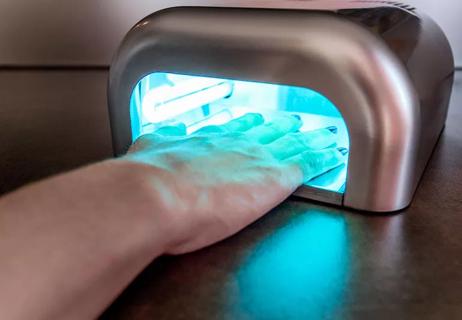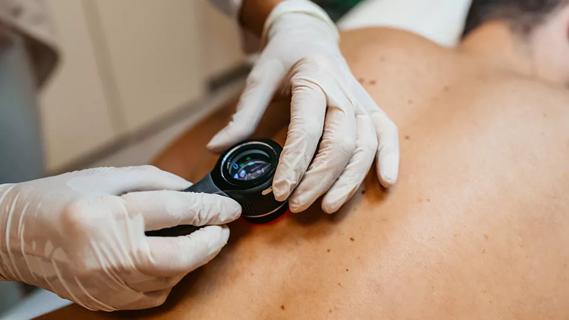Family history matters for melanoma, but the connection isn’t as strong for other skin cancers

Finding out a family member has skin cancer can feel like a punch to the gut. You worry about them and their journey from here.
Advertisement
Cleveland Clinic is a non-profit academic medical center. Advertising on our site helps support our mission. We do not endorse non-Cleveland Clinic products or services. Policy
But then, you worry some more. This time, for yourself and what their diagnosis may mean for you.
Because we know some cancers tend to run in families. But is skin cancer hereditary?
In some cases, yes, says dermatologist and skin cancer researcher Joshua Arbesman, MD. We talked with Dr. Arbesman about everything you need to know about the genetics of skin cancers and what to do if you have a family history of skin cancer.
You hear it over and over again: Wearing sunscreen reduces your risk of skin cancer. So, you slather that stuff on.
Covering yourself in broad spectrum SPF 30+ is one of the best ways we know (so far) that you can take action to reduce your risk for skin cancer — and protect your skin from the sun’s aging effects.
But wearing sunscreen is actually only one part of the equation.
What you can’t control is the other part. Your genetic makeup. And some genes handed down to you from your biological parents (and their parents and their parents and so on) can be a risk factor for skin cancer. Because some inherited traits can increase your risk of skin cancer, including melanoma, squamous cell carcinoma and basal cell carcinoma.
That includes things like:
Advertisement
But there’s even more to it.
Other genes — ones that have nothing to do with your appearance — can increase your risk for melanoma. But squamous cell carcinoma and basal cell carcinoma haven’t shown as strong a family connection. More on those in a bit.
Each year, doctors diagnose nearly 100,000 new cases of melanoma — the most invasive and dangerous type of skin cancer. When caught early, melanoma is easily treated. But left to its own devices, it can spread to other parts of your body and become life-threatening.
While overexposure to sunlight is a contributing factor to developing melanoma, the genetic component is quite strong.
A landmark study on cancer heritability in 2016 found that melanoma may even have a stronger genetic risk than some other well-known cancers. The researchers studied cancer rates in more than 200,000 sets of identical and fraternal twins over more than 30 years. They found that the genetic connection to melanoma was stronger even than the heritability of prostate cancer, ovarian cancer and breast cancer.
“It’s estimated that about 10% of melanoma patients have a family history, but we still have a lot of questions,” Dr. Arbesman reports. “Part of my research is looking to better understand the genetic determinants of melanoma that haven’t been uncovered yet.”
More than a dozen gene mutations have been connected to an increased risk of inherited melanoma, also known as familial melanoma. One of the most significant is a mutation in the gene CDKN2A.
“When people have a genetic alteration in that gene, it can increase the risk of melanoma quite dramatically — to the point where the risk of being diagnosed with melanoma is about 75% by the age of 75,” Dr. Arbesman continues. “The mutation also increases the risk of pancreatic cancer.”
For starters, Dr. Arbesman recommends making an appointment with a healthcare provider, like a dermatologist, for a full-body skin check. Plan to do that at least once a year, depending on your provider’s advice.
In addition, be vigilant about protecting yourself from sunburns and avoid tanning beds. If you notice any suspicious moles, bumps, lumps or lesions, see a provider quickly to get them checked out.
Beyond that, some people and their providers may consider genetic testing to see if they have inherited a higher risk for melanoma. But that’s not standard guidance. More of a case-by-case basis.
Genetic testing is fairly common for conditions like breast cancer. If testing shows you have an inherited mutation that raises your risk for breast cancer, you could consider a preventive mastectomy. (A weighty decision, but still an option nonetheless.)
Advertisement
But the question with genetic testing for melanoma risk is, What can you do with that information?
“Based on what we know about melanoma’s genetic connections, I think it’s reasonable to think about getting genetic testing if you have a first-degree relative who has melanoma,” Dr. Arbesman says.
“But I also think it’s important that if the test were to come back and show you are at an increased risk that there is something that can be done to proactively lessen that risk.”
For example, if you learned you were at a higher risk, you and your provider may consider enhanced screening techniques to help detect melanoma and other cancers at earlier stages, when treatment is less invasive and more likely to be successful. Or you may benefit from enhanced sun protection efforts, like sun-protective clothing and hats.
On the other hand, if living with the knowledge that your genes have put you at a higher risk for skin cancer will negatively and significantly impact your life, genetic screening may not be a good choice for you.
“It can be very devastating to learn that you have a genetic predisposition toward melanoma,” Dr. Arbesman acknowledges. “Some people take those test results to mean they shouldn’t leave their house for fear of sun exposure. That wouldn’t be the goal of the testing, and it’s not good for your overall health.”
Advertisement
Bottom line on genetic testing: Talk with your provider about your risk and the likely impact of the results on your life and your health.
Melanoma is the most serious form of skin cancer, so it makes sense that it’s been the most heavily researched. More research is needed to understand if there are strong familial links for non-melanoma skin cancers, like squamous cell carcinoma and basal cell carcinoma.
“When it comes to squamous cell carcinoma, the data are not as well characterized,” Dr. Arbesman shares. “We don’t know a lot for sure.”
One thing we do know is that Gorlin syndrome (also known as basal cell nevus syndrome) runs in families. It’s a rare condition that causes people to develop multiple basal cell carcinoma tumors across their bodies. It’s estimated that about 70% of people with Gorlin syndrome inherited the condition.
If a close relative has been diagnosed with squamous cell carcinoma or basal cell carcinoma, take that as a reminder to be thoughtful about sun protection and getting checked for suspicious moles and lesions. But no need to fret that you’re at significantly higher risk because of it.
Advertisement

Delivered every Tuesday!
Sign up for our Health Essentials emails for expert guidance on nutrition, fitness, sleep, skin care and more.
Learn more about our editorial process.
Advertisement

The simple, straightforward and hard-lined answer is no

Wear UPF clothing, apply sunscreen and try self-tanners instead of tanning beds

Frequent manicures, high-watt bulbs increase potential

The risk is less, but sunscreen is never a bad idea

The size, shape and color of moles may offer clues that point to melanoma

It’s a slow-moving process that offers an opportunity for early detection and treatment

Knowing your family history and getting a genetic test can help detect colorectal cancer earlier

Studies show the high health cost of spending hours in a chair

Type 2 diabetes isn’t inevitable with these dietary changes

Applying a hot or cold compress can help with pain